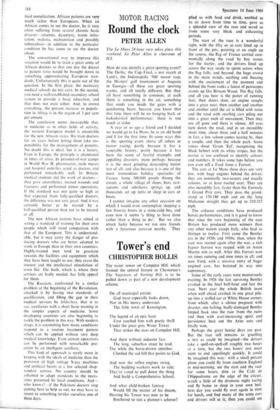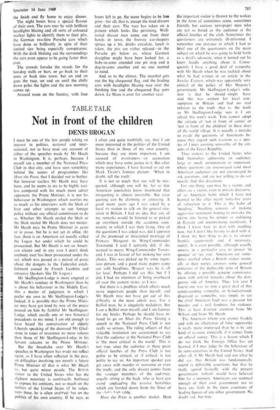Round the clock
MOTOR RACING PETER ALLEN
The Le Mans 24-hour race takes place this weekend. Sir Peter Allen is chairman of IC!.
How do you identify a great sporting event? The Derby, the Cup Final, a test match at Lord's, the Indianapolis '500' motor race, the Masters' golf tournament at Augusta in Georgia—all these are great sporting events, and all totally different. But they all have something in common; at each there is something in the air, something that sends you inside the gates with a quickening heart, because you know that this time there will be no hanging back or lackadaisical performance: there is too much at stake.
A year or so ago a friend and I decided we would go to Le Mans, he as an old hand and I for the first time. In some ways this is the sporting event above all others in motor racing, partly because it has a venerable history, partly because it has been the scene of fearful triumphs and appalling disasters, more perhaps because it is the most grinding demanding motor test of all; and also because it is one of the most tremendous holiday spectacles of France. Some 300.000 people throng the circuit, a whole village of shops, bars, rest- aurants and sideshows springs up, and thousands set up tents or sleep in cars or buses.
I cannot imagine any other occasion on which I would even contemplate sleeping a few frowsty hours in a stone-cold bus, and even now it seems 'a thing to have done rather than a thing to do'. But we also struck lucky because we ran into friends with a luxurious caravan nearby. They
plied us with food and drink, enabled us to sit down from time to time, gave us a splendid view of the race and saved us from some very bleak and exhausting periods.
The start of the race is a wonderful sight, with the fifty or so cars lined up in front of the pits, pointing at an angle up the course, the flag of France carried cere- monially along the road by boy scouts for the starter, and the drivers lined up across the way ready to sprint across when the flag falls; and beyond, the huge crowd in the main stands, seething and buzzing with the excitement of the moment and behind the front ranks a forest of periscopes stands up like Birnam Wood. The flag falls. and all you hear is the patter of running feet; then doors slam, an engine coughs into a great roar, then another and another and another until the air is filled with noise and the road with snarling cars piling out into a great mob of movement. Then they are all gone and there is silence. All eyes turn down the road, and in an incredibly short time, about three and a half minutes in fact, a low saloon comes tearing by, then a couple, and then the whole pack. Some voices shout 'Gram 'Eel', recognising the black helmet with its white stripes, but the novice is too confused to identify colours and numbers. It takes some laps before you can even tell a Ford from a Ferrari.
The cars at Le Mans these days are very low, with huge engines behind the driver; they are nominally two-seaters and usually saloons, or at least roofed over. They are also incredibly fast, faster than the Formula 1 Grand Prix cars. They pass the grand- stand at 170-180 mph and on the long Mulsanne straight they get up to 210-215 mph.
The arduous conditions have produced heroic performances, and it is good to know that since the very beginning of the race Britain has produced more winners than any other nation except Italy, who lead us thirteen to twelve. First came the Bentley era in the 1920s and 1930s; then, when the race was started again after the war, a rich Jaguar harvest was reaped, with an Aston Martin win as well. After this Ferrari won six times running and nine times in all; and now Ford, with a massive entry of huge- engined cars, has battered its way into supremacy.
Some of the early races were monstrously exciting. In 1926 the last surviving Bentley crashed in the final half-hour and lost the race. Next year the whole British team when well ahead crashed in one great pile- up into a stalled car at White House corner, from which, after a silence pregnant with disaster, one halting, badly-damaged Bentley limped back into the race from the ruins and then with ever-increasing spirit and persistence beat out the Aries cars and finally won.
Perhaps the great heroic days are past. But the race still remains as gruelling a test as could be imagined—the drivers take a spell-on-spell-off roughly two hours at a time, but the two hours' rest must seem to end appallingly quickly. It could be imagined this way: with a small private plane you could fly from southern England in mid-morning, see the start and the race for some hours, dine at the Café de l'Hippodrome on the edge of the circuit, watch a little of the dramatic night racing and fly home to sleep in your own bed; next day you could fly over again in time for lunch, and find many of the same cars and drivers still at it; then you could see
the finish and fly home to enjoy dinner.
The night hours have a special flavour of their own. The cars roar by with brilliant headlights blazing and all sorts of coloured marker lights to identify them to their pits, the German two-litre Porsche cars which have done so brilliantly in spite of their limited size being especially conspicuous. With the dark blotting out the surroundings the cars even appear to be going faster than ever.
The crowds forsake the stands for the hot-dog stalls or bars, or go back to their tents or back into town; but on and on goes the race, on and on until the chilly dawn pales the lights and the new morning comes up.
Around noon on the Sunday, with four
hours left to go, the scene begins to be less grim—for all, that is, except the tired drivers and their cars. The race has taken on a pattern which looks like persisting. Well- rested shaven men come out from their hotels in town, the frowsty car-sleepers spruce up a bit, drinks circulate, lunch is taken, the pits are rather relaxed—in the Porsche pit below us, where German discipline might have been looked for, a baby-in-arms attended one pit stop and a dog-in-arms another and no one seemed to mind.
And so to the climax. The marshal gets out the big chequered flag, and the leading cars with headlights blazing roar over the finishing line and the chequered flag goes down. Le Mans is over for another year.



































 Previous page
Previous page